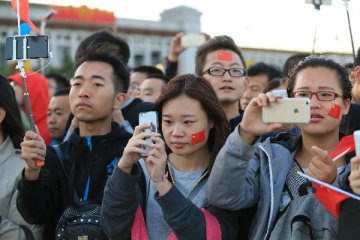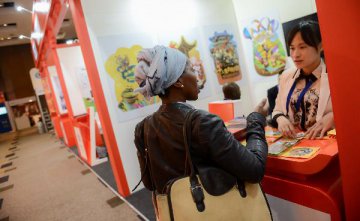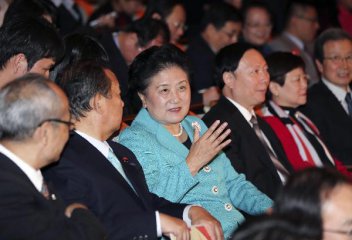
Ecuadorian university students will fly to China later this month to learn about the latest advances in information and communications technology (ICT) at Chinese telecom giant Huawei. As part of the company's program "Telecom Seeds for the Future," the 15 students will be Ecuador's first delegation to develop local ICT talent, enhance knowledge transfer and improve regional development of the digital community.
"We want to make the most of the opportunity to support the professional growth of young Ecuadorians in ICT," said Huawei Ecuador spokesperson Deyanira Cabrera. After 30 years of fast development, China has become a powerhouse for global technology innovation.
With the concepts of innovation, coordination, green development, opening up and sharing taking the center stage in China's new five-year plan, the development of the world's second largest economy is poised to generate even more opportunities for Latin Americans to make a difference in their lives.
CHINA'S GROWTH PATTERN TRANSITION BRINGS OPPORTUNITIES
For Jose Manuel Ortega Gil-Fournier, a winery owner in Argentina, China's development will create a huge market for his business. According to the recently unveiled 13th Five-Year Plan, China aims to double the gross domestic product (GDP) and the per capita income of both urban and rural residents of 2010 by 2020, and to shift the engine of growth from investment and exports to domestic consumption.
China's rapidly expanding middle-income group, who are changing their food consumption patterns, will be the target consumers for Ortega. In the past five years, Ortega has traveled to China five times a year to get to know the market and to quench his thirst for Chinese culture.
"China is a big consumer of high-end wines. We want to convince the Chinese market and its consumers that France isn't the only good wine producer. Argentina can also make high quality wines," said Ortega. China's "growth pattern is truly changing from an investment, export-led economy to a domestic consumption, services-driven one, leading to slower albeit healthier growth," Livio Ribeiro, an economist at the Getulio Vargas Foundation in Brazil, told Xinhua.
With deeper urbanization and increasing demand for soft commodities, China will most likely buy much more food and services by the end of this decade. "Understanding that is vital to play along with the growth (pattern) transition and reap all the opportunities it will create," Ribeiro said.
MADE IN CHINA, DELIVERED IN LATIN AMERICA
Economic and social development in China in the next five years will also bring more Chinese products to Latin American consumers, especially thanks to the fast development of China's e-commerce sector. China's "Singles' Day" that falls on Nov. 11, originally a sort of anti-Valentine's day for the unattached, has morphed into the country's biggest online shopping day.
During the shopping festival, Chinese e-commerce giant Alibaba promoted special discounts for Brazilian consumers on the Portuguese edition of its global shopping portal AliExpress. Brazilian shoppers could get a 30-percent discount on Xiaomi smartphones and 45-percent discount on Li Ning sportswear, among other Chinese products on AliExpress, the second largest online shopping platform in the South American country.
With online shoppers in Brazil reaching 61.6 million in 2014 and e-commerce sales predicted to reach 43 billion reais (about 11 billion U.S. dollars) by the end of 2015, the growing sector in Brazil can be benefited from China's e-commerce know-how. About 20,000 parcels are delivered by China Post to Brazil every day from Yiwu, a large wholesale commodity provider in east China's Zhejiang Province.
"Most commodities sold along Sao Paulo's famous March 25 Street shopping district come from Yiwu," said Qiu Genjun, general manager of China Express Latin America Co., Ltd. The close cooperation between China Post and Brazil Post has greatly reduced transport costs, lowered the odds of lost packages and quickened customs clearance to improve parcel deliveries in Brazil.
SPILLOVER EFFECT OF CHINA'S DEVELOPMENT
In the coming five years, China is determined to enhance its competitiveness through reform and innovation. Innovation must be at the core of state strategies. Reforms are needed in particular to innovate systems and mechanisms to spur market energy, boost creativity and release the potential demand of the country's 1.3 billion people, Chinese Premier Li Keqiang said Monday.
At a time of economic globalization, the spillover effect of China's development through reform and innovation can also buoy Latin American developing nations, as the world's second largest economy is looking for more overseas investment opportunities.
Venezuelan President Nicolas Maduro last week attributed the industrial progress in his country to cooperation with China and announced that this month a Yutong bus plant will open to assemble units of the Chinese brand for Venezuela's public transport system.
"Venezuela will have the most advanced bus plant in Latin America and the Caribbean region," Maduro said. Meanwhile, Argentina and China made "important headway" last week by wrapping up negotiations on building the Latin American country's fourth nuclear plant.
The two sides also worked out the framework of the fifth plant, which will be built with Chinese technology and funding. These new plants will double Argentina's nuclear power capacity and strengthen its energy security and independence, said a spokesperson for the state-run nuclear energy company Nucleoelectrica Argentina.
In addition, Latin America is expected to receive more Chinese tourists. In the coming five years, Chinese tourists will make more than 500 million overseas trips, said Chinese President Xi Jinping in September during his state visit to the United States.
In Mexico, the Ministry of Tourism has taken some significant steps to lure Chinese travelers to its beaches, historic landmarks and cities, as it predicts that its potential Chinese market numbers 10.7 million. The ministry declared 2015 to be the Year of China-Mexico Tourism and embarked on a promotional tour in China, including participating in a travel trade fair and holding seminars for Chinese travel agencies.
Argentine winery owner Ortega also has his eye on Chinese tourism. He plans to build a five-star hotel to house investors who buy between one and three hectares of land at his winery. "I hope it will bring in more Chinese tourists once it is completed," he said.























Latest comments